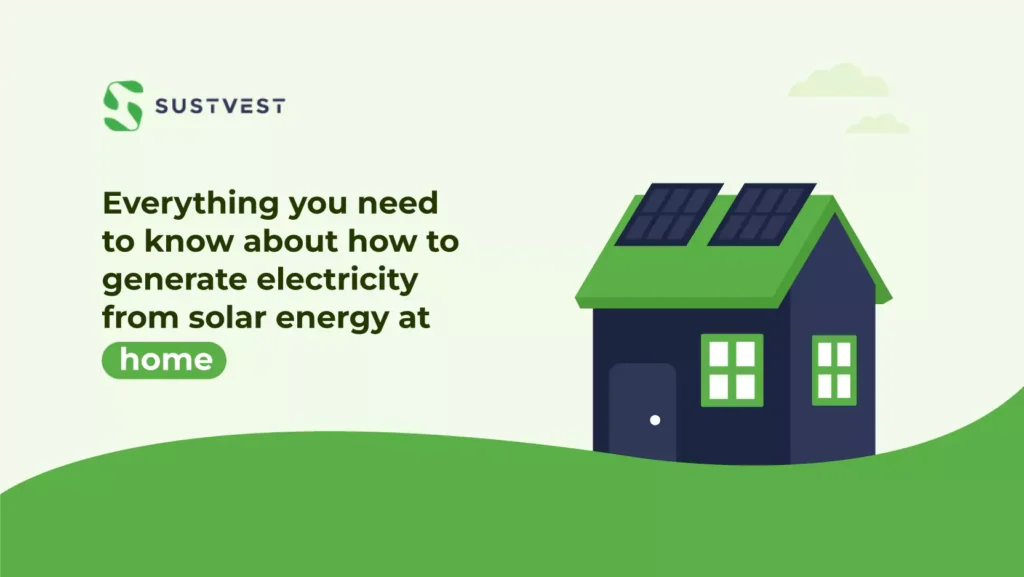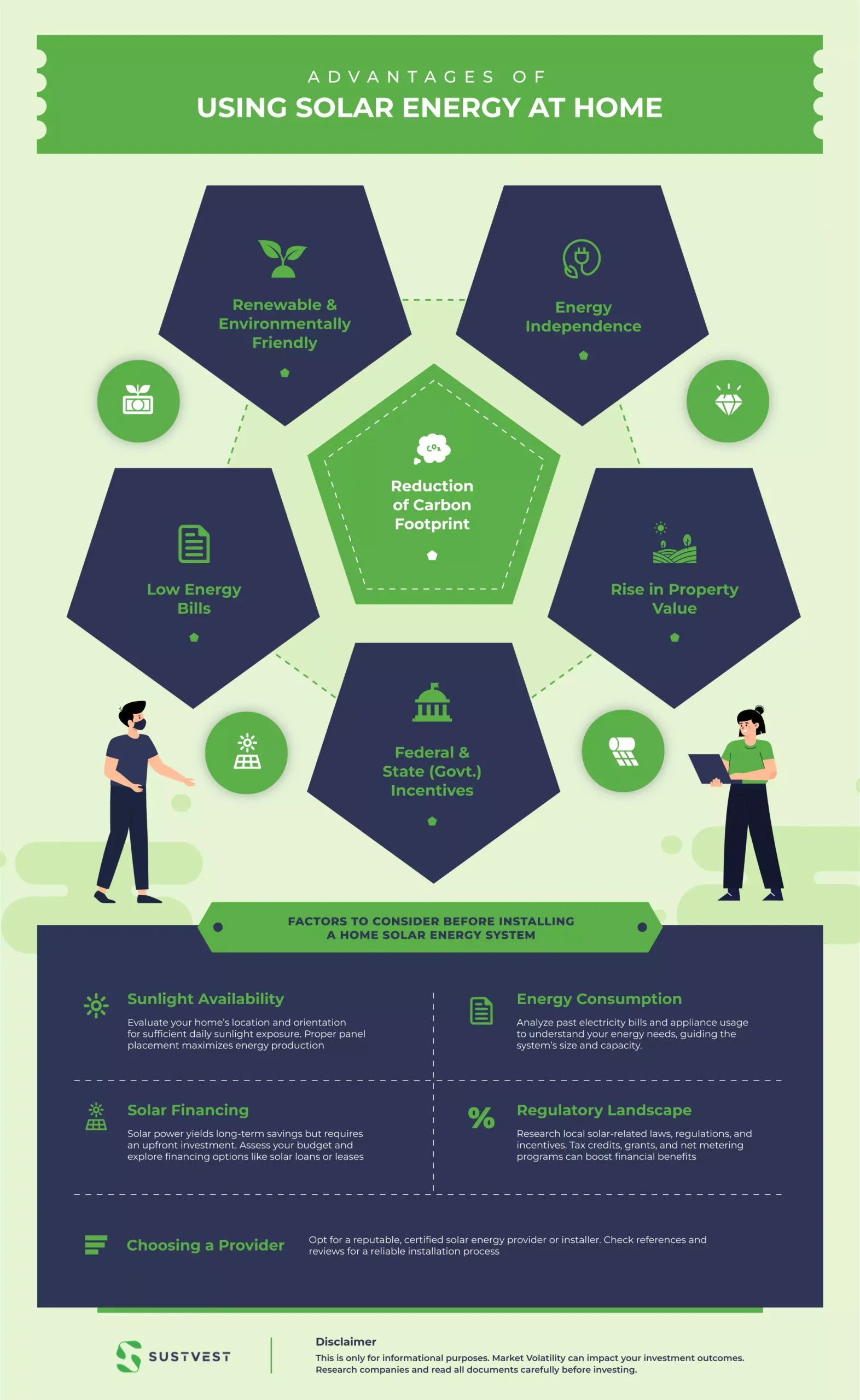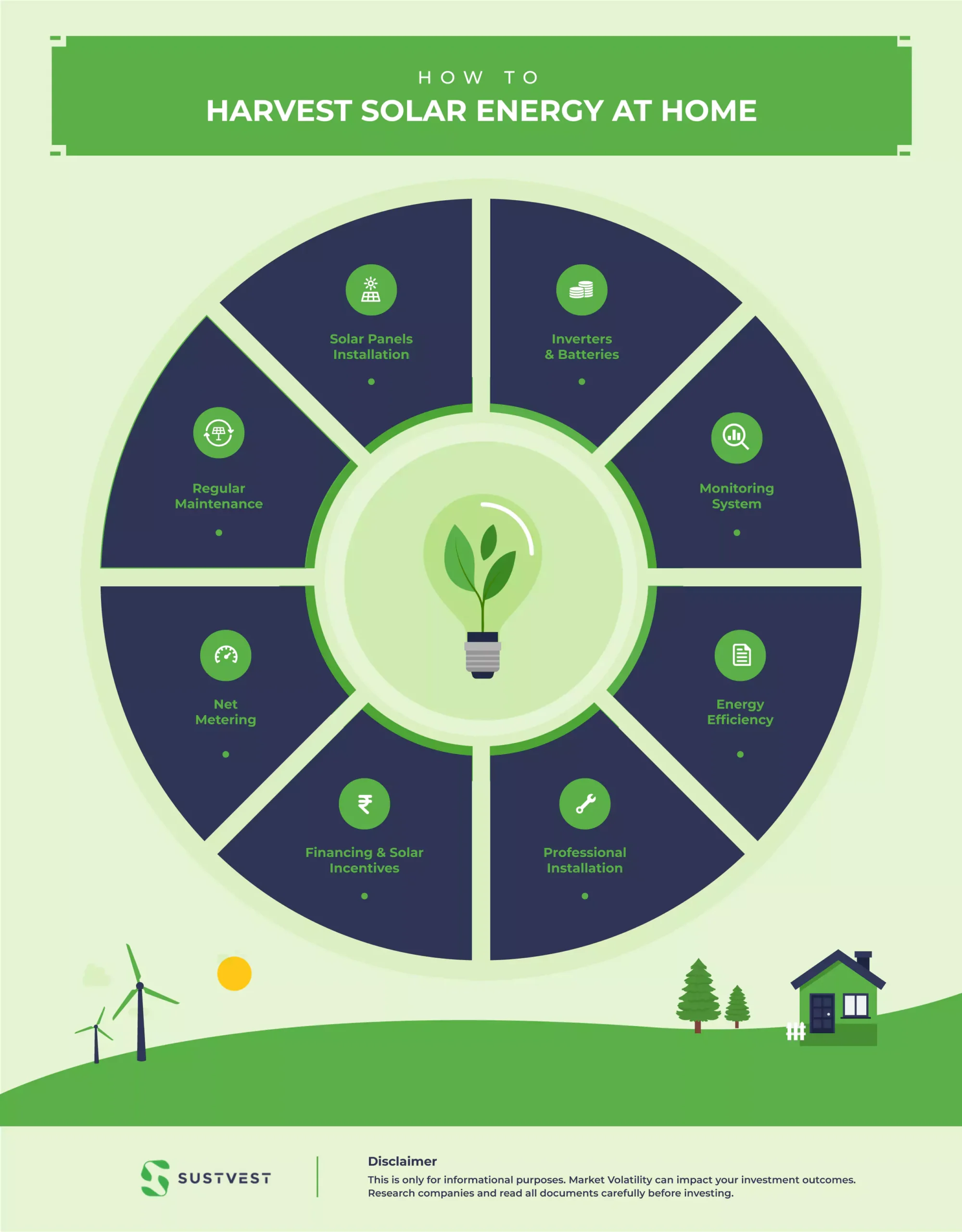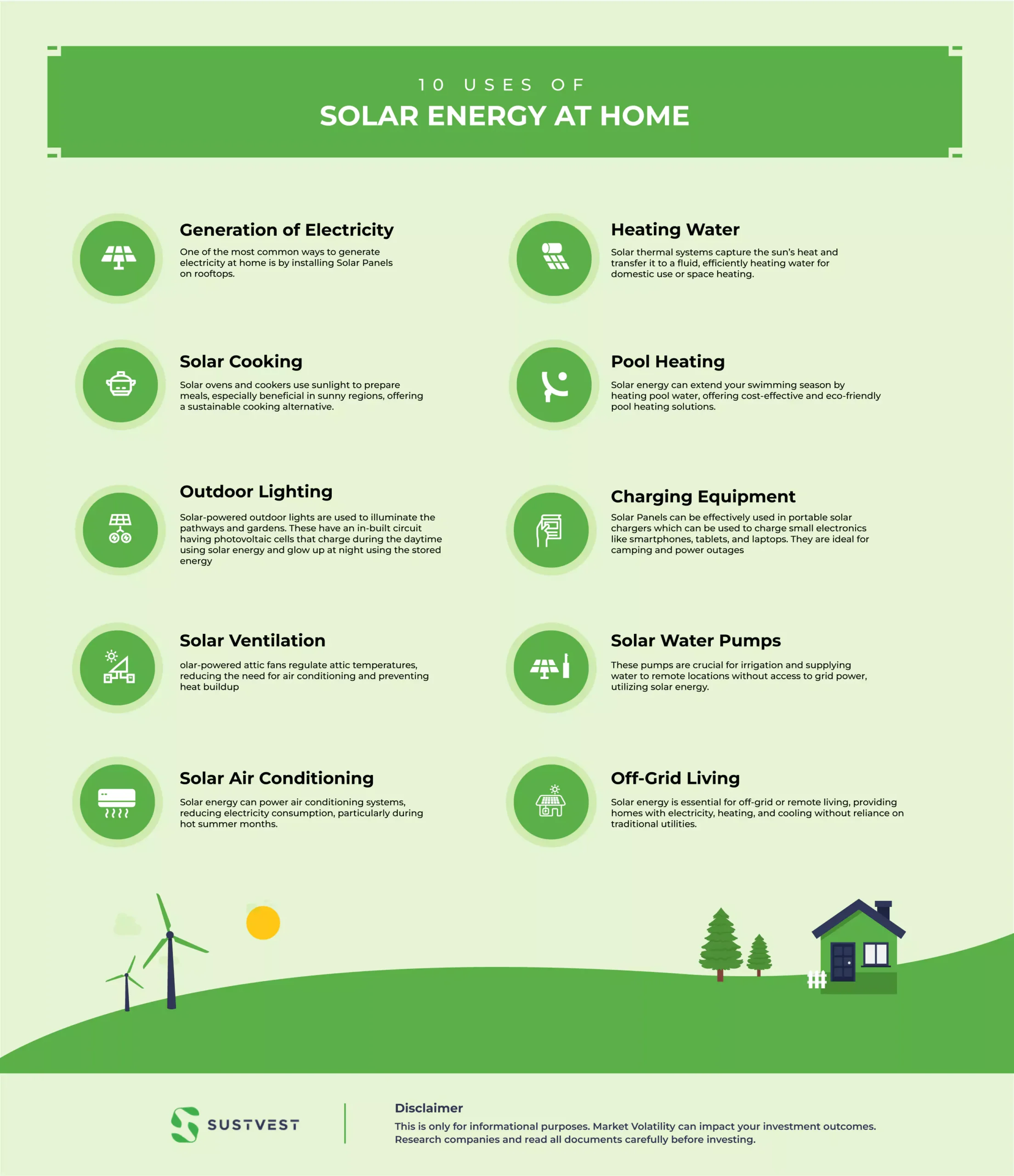Introduction
In an era where the significance of sustainable living and environmentally conscious decisions has escalated, one of the efficient solutions is to harness the energy of the sun to produce electricity within one’s residence.
Whether you are a homeowner aiming to decrease your environmental impact or an investor wanting to know how to start a solar panel business intrigued by the expanding market for renewable energy, this article will offer valuable knowledge and practical suggestions.
Solar panels are day by day becoming an opportunity to significantly reduce the dependence on conventional energy sources like fossil fuel as now they are affordable and easily obtainable for property owners.
Moving ahead in this blog, we will explore the future energy outlook and deep dive into everything required to know about how to generate electricity from solar energy at home.

Understanding Solar Energy
Solar energy can be captured and converted into electricity using solar panels, which are also called photovoltaic (PV) panels. It is abundant and freely available radiant energies emitted by the sun
PV panels consist of semiconductor materials made of silicon, which soak up sunlight and produce an electric current through a phenomenon called the photovoltaic effect.
Advantages of Using Solar Energy at Home
Before we move ahead with solar energy generation, let us first explore the few advantages of using solar energy at home.
- Renewable and Environmentally Friendly:
Solar energy does not produce harmful greenhouse gases, unlike fossil fuels which makes it a sustainable option for a greener future.
- Energy Independence:
Homeowners can achieve energy independence by utilizing the sun’s energy. Solar power reduces reliance on conventional utility providers by providing a consistent source of electricity.
- Low Energy Bills:
One of the main benefits of adopting solar energy at home is significant cost savings. Electricity expenses can be significantly decreased or even using the sun’s free energy.
- Rise in Property Value:
Solar-paneled homes frequently have a better resale value. Properties with lower energy expenses and eco-friendly features are more appealing to buyers.
- Federal and State (Govt.) Incentives:
Several governments provide financial incentives including tax credits in order to promote the use of solar energy systems. Most of the time the initial installation costs are covered by these incentives.
- Reduction of Carbon Footprint:
Using solar energy at home significantly reduces your carbon footprint. It is an environmentally responsible choice that helps combat climate change.
So far we have covered the advantages of solar energy at home, now let us know about the various uses of solar energy and how to effectively harness it.

Factors to Consider Before Installing a Home Solar Energy System
Before venturing into the world of solar energy, homeowners must weigh key factors to ensure the feasibility of solar electricity generation. While solar power offers numerous benefits, thoughtful consideration is vital.
- Sunlight Availability:
Evaluate your home’s location and orientation for sufficient daily sunlight exposure. Proper panel placement maximizes energy production.
- Energy Consumption:
Analyze past electricity bills and appliance usage to understand your energy needs, guiding the system’s size and capacity.
Solar power yields long-term savings but requires an upfront investment. Assess your budget and explore financing options like solar loans or leases.
- Regulatory Landscape:
Research local solar-related laws, regulations, and incentives. Tax credits, grants, and net metering programs can boost financial benefits.
- Choosing a Provider:
Opt for a reputable, certified solar energy provider or installer. Check references and reviews for a reliable installation process.
Carefully considering these factors enables homeowners to make informed decisions regarding solar energy’s alignment with their goals and needs. Further, we will delve into the steps for designing and installing a solar energy system at home, bringing the future of solar energy in India to your residence.
How to Harvest Solar Energy at Home
Now that you are aware of the advantages and uses of solar energy at home, let us discuss how to effectively harvest this clean and renewable resource.
- Solar Panels Installation:
Installing solar panels on your roof or in an open space with plenty of sunlight is the first step towards utilizing solar energy at home, make sure they are mounted at the ideal angle and direction for best energy capture. Photovoltaic cells used in these panels turn sunshine into electricity.
- Inverters and Batteries:
Solar inverters convert the energy produced by solar panels i.e. direct current (DC into alternating current (AC) suitable for household use. Batteries store excess energy generated during the day for use at night or during cloudy periods.
- Regular Maintenance:
To keep your solar panels operating efficiently, they require periodic maintenance. Cleaning the panels to remove dirt and debris, checking for any damaged components, and ensuring proper wiring and connections are crucial.
- Monitoring System:
Installing a monitoring system allows you to track your solar system’s performance and energy production. You can identify any issues quickly and optimize energy usage.
- Net Metering:
Some regions offer net metering programs, allowing you to sell excess energy back to the grid and receive credits on your electricity bill.
- Energy Efficiency:
It is essential to make your home as energy-efficient as possible, to maximize the benefits of solar energy. This includes sealing gaps, upgrading insulation, and using energy-efficient appliances and lighting.
- Financing and Solar Incentives:
Explore government incentives, tax credits, and financing options to make the initial investment in solar panels more affordable. These incentives can significantly reduce the payback period.
- Professional Installation:
While some homeowners opt for DIY solar panel installation, it’s often advisable to hire a professional installer with experience in setting up solar systems. They can ensure the installation complies with local regulations and maximizes energy production.

10 Uses of Solar Energy at Home
A wide range of purposes within your home can be done using Solar Energy. Here are ten uses of solar energy and how to effectively harvest it :
Generation of Electricity: One of the most common ways to generate electricity at home is by installing Solar Panels on rooftops.
Heating Water: Solar thermal systems capture the sun’s heat and transfer it to a fluid, efficiently heating water for domestic use or space heating.
Solar Cooking: Solar ovens and cookers use sunlight to prepare meals, especially beneficial in sunny regions, offering a sustainable cooking alternative.
Pool Heating: Solar energy can extend your swimming season by heating pool water, offering cost-effective and eco-friendly pool heating solutions.
Outdoor Lighting: Solar-powered outdoor lights are used to illuminate the pathways and gardens. These have an in-built circuit having photovoltaic cells that charge during the daytime using solar energy and glow up at night using the stored energy.
Charging Equipment: Solar Panels can be effectively used in portable solar chargers which can be used to charge small electronics like smartphones, tablets, and laptops. They are ideal for camping and power outages.
Solar Ventilation: Solar-powered attic fans regulate attic temperatures, reducing the need for air conditioning and preventing heat buildup.
Solar Water Pumps: These pumps are crucial for irrigation and supplying water to remote locations without access to grid power, utilizing solar energy.
Solar Air Conditioning: Solar energy can power air conditioning systems, reducing electricity consumption, particularly during hot summer months.
Off-Grid Living: Solar energy is essential for off-grid or remote living, providing homes with electricity, heating, and cooling without reliance on traditional utilities.
Homeowners can reduce their environmental impact, lower energy costs, and embrace a sustainable and renewable energy source for various household needs. By effectively implementing these solar solutions.

FAQ
Q1. What factors should I consider before installing a home solar energy system?
A1. Key factors to consider include:
1. Sunlight availability and proper panel placement.
2. Understanding your energy consumption.
Budget and financing options.
Local laws, regulations, and incentives.
Choosing a reputable solar energy provider.
Ensuring energy efficiency in your home.
Q2. Is solar energy suitable for all regions and climates?
A2. In the regions where there is ample sunlight, solar energy is most effective in those regions, but now advancements in solar technology have made it viable in a wide range of climates. In cloudy or less sunny areas also solar energy is accessible as solar panel efficiency and energy storage solutions have improved.
Conclusion
Discover everything you need to comprehend about producing electricity from solar power within the comforts of your own abode, choose wisely from the different types of solar panels available. This is a pivotal step towards embracing a more eco-friendly and sustainable way of life.
Countless advantages accompany solar energy, including reduced energy expenses, enhanced property valuation, and a reduced carbon footprint. Embrace solar energy in a multitude of ways, such as powering your household, heating water, cooking, and even charging your electronic devices.
By following the recommendations outlined in this comprehensive manual, you can harness the potential of solar energy and contribute to a greener future for forthcoming generations.
Waste no time and seize the advantages of solar energy at home by making the switch today. For further information regarding this topic and the possibilities of solar power, please refer to SustVest.

Founder of Sustvest
Hardik completed his B.Tech from BITS Pilani. Keeping the current global scenario, the growth of renewable energy in mind, and people looking for investment opportunities in mind he founded SustVest ( formerly, Solar Grid X ) in 2018. This venture led him to achieve the ‘Emerging Fintech Talent of the Year in MENA region ‘ in October 2019.




